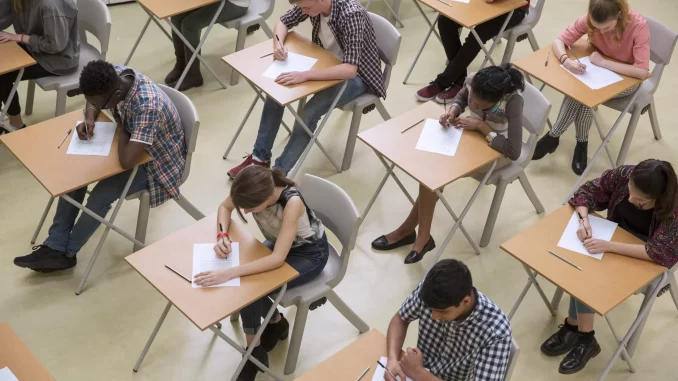
By Hank Russell
The U.S. Education Department’s (ED) decision to enter into separate interagency agreements (IAA) with four other agencies has raised concerns with local school and elected officials.
On November 18, Education Secretary Linda McMahon announced that she entered into IAAs with the Departments of Labor, Interior, Health and Human Services (HHS) and State. McMahon said the new partnerships will help improve the management of select ED programs by leveraging partner agencies’ administrative expertise and experience working with relevant stakeholders.
These agreements follow a successful workforce development partnership signed with DOL earlier this year, which has created an integrated federal education and workforce system and reduced the need for states to consult multiple federal agencies to effectively manage their programs, according to McMahon.
Under these agreements:
- The Education and Labor Departments will establish the Postsecondary Education Partnership to better coordinate postsecondary education and workforce development programs. DOL will take on a greater role in administering most postsecondary education grant programs authorized under the Higher Education Act.
- The Education Department, along with the Interior Department, will establish the Indian Education Partnership to improve Native American education in the United States. DOI will take on a greater role in administering Indian Education programs relating to elementary and secondary education, higher education, career and technical education, and vocational rehabilitation.
- The Education Department and the HHS will establish the Foreign Medical Accreditation Partnership to apply the expertise of HHS staff to evaluating whether the standards of accreditation for foreign medical schools are comparable with the standards for medical schools in the U.S. Both agencies will also establish the Child Care Access Means Parents in School (CCAMPIS) Partnership to improve on-campus child care support for parents enrolled in college.
- Along with the State Department, the Education will establish the International Education and Foreign Language Studies Partnership to improve efficiencies for programs administered under the federally funded Fulbright-Hays grant, which supports research and training efforts overseas, which focus on non-Western foreign languages and area studies.. The partnership provides an opportunity to streamline international education program funding and data collection measures, consolidate program management, and advance national security interests.
“The Trump Administration is taking bold action to break up the federal education bureaucracy and return education to the states,” McMahon said. “Cutting through layers of red tape in Washington is one essential piece of our final mission. As we partner with these agencies to improve federal programs, we will continue to gather best practices in each state through our 50-state tour, empower local leaders in K-12 education, restore excellence to higher education, and work with Congress to codify these reforms. Together, we will refocus education on students, families, and schools – ensuring federal taxpayer spending is supporting a world-class education system.”
Bob Vecchio said he is “paying close attention” to what the federal government is doing. “I am concerned about future funding with these changes,” adding that schools are “underfunded.”
He said, while the Education Department “may go away,” IDEA (Individuals with Disabilities in Education Act) — an unfunded mandate — and the Elementary and Secondary Education Act, which requires states and public school systems to focus on educational accountability in order to receive title funding, “will not go away.”
Vecchio also expressed concern that there will be a shift from title to block grants. “Title grants are formula-based,” Vecchio said, whereas block grants — which he opposes — would not necessarily go to schools.
Governor Kathy Hochul and state Education Commissioner Betty Rosa issued a pointed statement.
“The Trump administration’s decision to tear apart the Department of Education carries catastrophic consequences for education nationwide,” they said. “By outsourcing the Department’s responsibilities to other federal agencies, the administration is moving closer to its misguided goal of dismantling our education system, and in doing so, threatens to upend New York’s school system putting millions of students’ educations at risk. Make no mistake, this maneuver is a direct attack on New York teachers, students, and families and its effects will be felt in schools statewide.”
Timothy Eagan, president of the Suffolk County School Superintendents Association, called the Education Department’s move “deeply troubling.”

